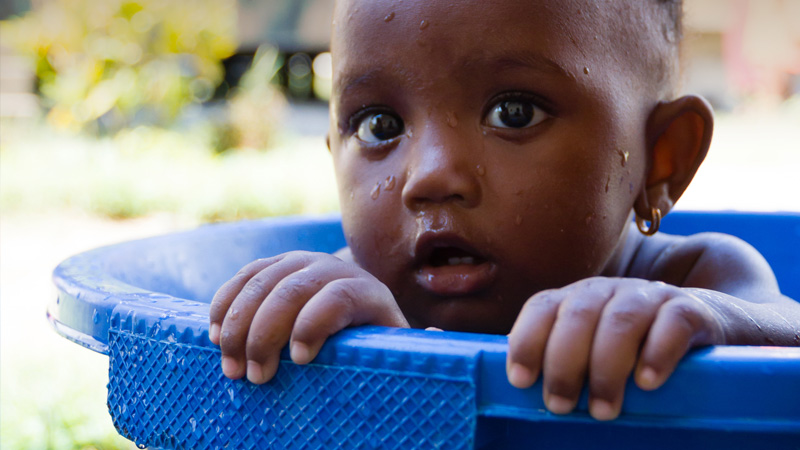Sandrine’s elation turned to shock when her longed-for daughter was born. The baby’s tiny feet were twisted at severe right angles, facing inward. The heartbroken mother tearfully wrapped Serah’s disfigured feet and could not find the courage to look at them again for three days.
Sandrine’s husband had been delighted about his daughter’s birth, but he felt ill when he learned about her clubfeet. He feared her options for the future in Madagascar would be limited. He thought the disability would prevent Serah from marrying and establishing a family support network of her own.
Sandrine shares, “I was embarrassed about my baby. People were looking at her – everyone’s eyes were on her.†And Serah’s grandmother cried with despair.
The midwife was able to help the family understand there was hope for Serah because Mercy Ships was returning to Madagascar. She assured them the hospital ship’s Ponseti program had corrected many babies’ clubfeet in the past year. They could help Serah too.
Sandrine took her baby to a screening day after the Mercy Ship docked. When she received an appointment card for treatment, she held Serah close and danced for joy around her garden. Hope had finally arrived!
When Serah was seven months old, they began weekly visits to the Mercy Ships Ponseti clinic. The treatment protocol, developed by Dr. IgnacioV. Ponseti, corrects congenital clubfoot without invasive surgery. According to lead orthopedic surgeon Dr Frank Haydon (USA), this method of reversing clubfoot conditions needs minimal specialized equipment, which makes it ideal for developing nations. The key is local adoption of the program. “It can’t be guaranteed by a charity or by government. It must be sustained by the culture,†he explains.
Ponseti team crewmembers Nick (AUS) and Suzanne Veltjens (USA) collaborated with several Malagasy physiotherapists led by Dr Razafindravoanjo. He comments, “We have treated 15 children with perfect results (100% correction). Now we can treat children up to three years old. Maybe in the future there will be no older people with clubfeet in Madagascar because now we have three years in which to treat children with this condition!â€
Each week’s therapy began with Serah and the other babies happily playing in water tubs while their mothers soaked off the previous week’s plaster casts and chatted.
Serah grew used to the physio team “playing†with her bent feet – gently stretching and manipulating – focusing one week on one degree and direction of foot flexion and then focusing the next week on a different direction. After each session, Serah’s feet were held in the newly attained position by fresh plaster casts on her wriggling and kicking legs.
Serah had a total of six little casts consecutively on both legs before her tenotomy procedure. This snip of her Achilles tendons allowed her feet to fully pop into the final corrected position. To maintain this ultimate degree of foot flexion, she wore miniature foot braces for three months.
Over months of therapy, the Ponseti team helped Sandrine understand how vital her commitment to Serah’s ongoing treatment is. In the final stage (the longest of the treatment), Sandrine must ensure Serah wears the supplied foot braces every single night until she is four or five years old. Only then will Serah’s clubfeet be permanently corrected.
Sandrine says, “I was so sad, but now I am overjoyed. Now we’re going to show Serah off, saying, ‘Here we are! Come and see my baby!’ I am very happy now she has ‘real’ feet.â€
When Serah takes her first steps, she will be just like all her little toddler friends. No one will be able to tell she was born with a disability.
Serah will never remember living with the burden of bilateral clubfeet, but Sandrine will never forget the life-sentence of disability her
Mission
Accomplished
Record-breaking success for Mercy Ships Cargo Day 2023!
Your participation is changing lives across Africa.
Thank you for your amazing support.
Your participation is changing lives across Africa.
Thank you for your amazing support.

